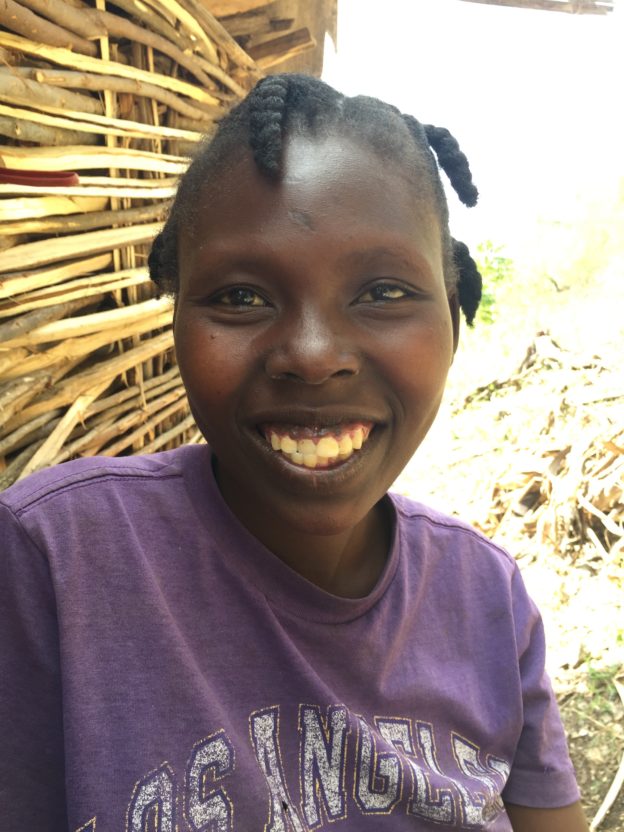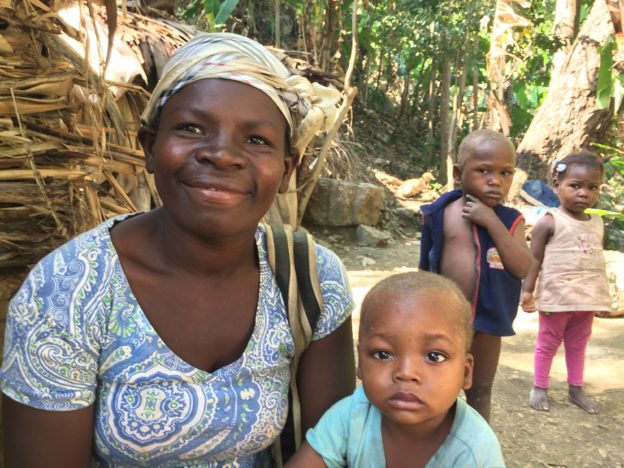As a CLM regional director, I was responsible for three cohorts of families: 250 in Northern Boucankare, 350 in Western Tomond, and 360 in Southern Mibalè. What I didn’t notice at that time was that the three regions shared an important characteristic. All are areas where the high quantity of clay in the soil means that poor families can build their homes out of rocks and mud. If the mud is well mixed and allowed to set, it can serve as reliable mortar.
This makes a big difference to CLM members, for whom home construction or repair is one of the central parts of the package. The program expects members to contribute considerably to repair or build of their home. We provide only roofing material and cement for a floor. Structural lumber and the material for the walls are the family’s responsibility. Providing the rocks and mud for walls involves only finding them and carrying them to the construction site. Members do not normally have to buy them. Where members have to use palm wood, however, they have to buy trees and then pay to have them chopped down and cut into planks. It can add several thousand gourds to their costs.
So it should not be surprising that completing home repair and construction is one of the biggest challenges that CLM members in Kolonbyè face as they approach nine months in the program. When the six in Fon Desanm and Kaprens were asked how they are doing, they all responded as though I had asked them how their home construction is progressing. The chance for a new home, and the serious challenges they must overcome to complete one, is dominating their thinking these days.
Rosana’s made good progress with hers. Three of the walls are complete, and a fourth is partially finished. She needs some palm wood planking to finish the fourth wall, and then six planks of hardwood for the doors. 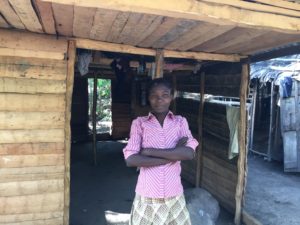
But as far as she’s come, that leaves her with a lot to accomplish still. Palm wood isn’t sold by the plank, so she’ll need to buy another tree, even though she doesn’t need all of it. She can save money because her husband has the tools and the skills to prepare the planks himself, but she still expects to have to come up with another 3,000 gourds to finish their new home. That’s more than $40.
And her commitment to getting it done has already made her life harder. She had been sharing responsibility with her husband for earning the money they need to feed themselves and their children. He does day labor in their neighbor’ fields, and she had her small commerce, selling bread, sugar, and coffee out of her home. But she drained the capital out of her business buying palm trees for the house, so the family has had to eat on the 50 gourds – less than $1 – that her husband can earn for a day’s work. And there are eight children.
Keeping their children fed is especially hard this year. They are farmers, but they lost both of their most important staple crops. Their millet was destroyed for the second consecutive year by disease, and their pigeon peas were eliminated by Hurricane Matthew. They didn’t have enough cash to plant anything this year for next year’s harvest, so they’ll need to increase their other forms of income just to get by.
Rosana took a first step towards building up her income by taking out a loan from her Village Savings and Loan Association. These are organizations that we are now establishing everywhere we work. Members buy from one to five shares at weekly meetings. Share prices are determined when the group meets together the first time. They can take out loans for as much as three times what they have contributed, and they repay them with interest. At the end of a year, the whole pot is divided, each person receiving a portion determined by the number of shares she purchased over the course of the year.
Rosana took out a loan for 2,500 gourds, and she invested it in beans. She would buy them each week in Savanèt, and then sell them in Kolonbyè. She’d be able to buy about 30 mamit, or cans full, and make about ten gourds per can. But here, too, a thousand gourds of her capital ended up going into buying palm trees, which left only 1,500 in her business. That wasn’t enough to make her trips to Savanèt worth her while. So for now she will go back to selling bread, sugar, and coffee. She’s still trying to figure out how she’ll repay her VSLA loan.
Marie Yolène hasn’t gotten nearly as much done towards building her new home as Rosana has. She needs three more palm trees and the lumber for her doors, and she isn’t yet clear how she’s going to take the last steps.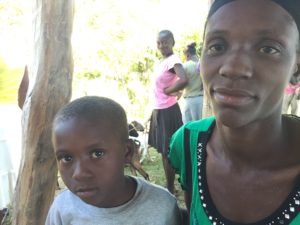
One of her goats had a kid, but the kid didn’t survive. The other is pregnant. Her bigger hope rests right now on her pig, which should have piglets in April. Like Rosana, she and her husband lost their millet and pigeon peas last year. Since she has no small commerce at all, they are entirely dependent on the 50 gourds her husband can earn as a day laborer.
Like Rosana, Marie Yolène would like to borrow money from their VSLA, but Marie Yolène feels she needs to do it just to buy what she’ll need to finish her house. And if she borrows money for something other than commerce she could have trouble repaying the loan, as other VSLA members are discovering.
Monise has made some progress on her home, but she still has a long way to go. She started out with an advantage because she was able to take some of the palm wood planking that she needed from an extra room in the home she was already living in, and her older boy’s father sent her enough money to buy another palm tree. But she still needs two or three trees. And the man was killed in an accident in Port au Prince. He was changing a truck’s tire, with the truck up on a jack, when it was hit by another truck and fell on him.
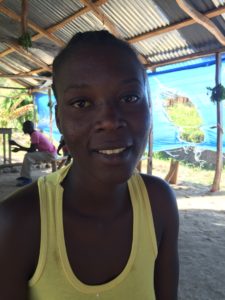 She seems to have begun taking a more clear-eyed look at her situation, though. Until recently, she had been counting on her infant’s father to return from the Dominican Republic and help her with the expenses of setting up her new house, but a couple of promised visits failed to materialize, and she now recognizes that she has no idea when or even if he’ll come back. “Now I’m both mother and father to my kids,” she says.
She seems to have begun taking a more clear-eyed look at her situation, though. Until recently, she had been counting on her infant’s father to return from the Dominican Republic and help her with the expenses of setting up her new house, but a couple of promised visits failed to materialize, and she now recognizes that she has no idea when or even if he’ll come back. “Now I’m both mother and father to my kids,” she says.
One of her goats had a healthy kid, and the other is pregnant. She’s taking good care of her boar, and it’s growing. She hopes to use it eventually to buy a cow. “Cow’s are more valuable. And if you have a female, it will give you calves.”
She gave up her small commerce for now. She felt that she’d be better off using the money to plant a crop of beans in April. If her harvest is good, it could really help her progress.
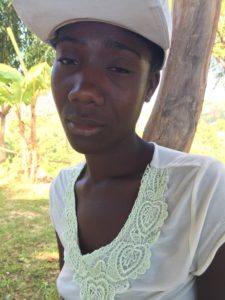 Altagrace is close to finishing her home because she decided to take a short cut. After sitting down with her husband and her mother, who owns the house they all live in now, she decided to repair that house rather than building a new one. “I wanted to stay with my mother. I’m all she has. And my husband agreed to the plan.”
Altagrace is close to finishing her home because she decided to take a short cut. After sitting down with her husband and her mother, who owns the house they all live in now, she decided to repair that house rather than building a new one. “I wanted to stay with my mother. I’m all she has. And my husband agreed to the plan.”
Part of the house is already covered with tin roofing. There are just a few rusted sheets that need to be replaced. After that, she’ll need about ten sheets of the sheets we gave her to cover the rest of the house, which is still covered with tach, the roofing material that poor rural Haitians get from palm trees. When she’s finished, she may even have tin left over that she can sell to neighbors.
Perhaps the most interesting part of this plan is that it seems to have been hers, motivated less by the cost savings than by her desire to continue living with her mother. In our early meetings with Altagrace, her husband would sometimes dominate the conversation. He seemed very much in charge and not very respectful. When, for example, she told us that she had her first child as a 13-year-old sixth grader, he injected with a smile that she was in too much of a hurry though he, too, had been a student at the time. And we think that, at least at first, he was making most of the decisions about the weekly stipend she received. So we’re happy to see signs that she might be establishing a role as a decision maker.
The two still need to work together, because since Altagrace does not have a small commerce, they depend on day labor to keep the household fed. “I’d like to earn the money myself, but things are hard.” They work in fields in two different ways. Most of the time they simply vann jounen or “selling a day.” That means one of them, usually her husband, works in someone’s field for 50 gourds and a meal. He can bring home the cash and, perhaps, some of the food as well. But sometimes they work asosye, or “in association.” One or both of them will work in a large field as part of a team that’s hired as a team. Here they are paid for a job – whether weeding or planting the whole field, for example – and the team divides the fee. For the time being, their relationship seems to be working, though we hope we’ll continue to see signs that Altagrace is able to assert herself.
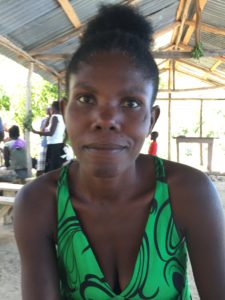 Solène’s home is almost finished. It lacks only doors and windows, and the hardwood planks she’ll need to make and install them is ready. She’s just waiting for the carpenter to finish his job. She may have felt more rushed than other members of this group. “I was living in the shed we made for my goats, and we’d get soaked every time it rained.”
Solène’s home is almost finished. It lacks only doors and windows, and the hardwood planks she’ll need to make and install them is ready. She’s just waiting for the carpenter to finish his job. She may have felt more rushed than other members of this group. “I was living in the shed we made for my goats, and we’d get soaked every time it rained.”
But getting her new home to the point that she could move in took everything she had and more. She used the money she had in a small commerce to buy some of the palm trees she needed, and then borrowed money from her VSLA to buy the rest. But now she and her husband depend on his day labor both to feed the household and to repay the loan.
It’s just not enough. The first installment of her loan was about 800 gourds, and she was short almost 300, even though she cut down on household expenses so much that she felt she had to stop sending her children to school. She can’t afford anything for them to eat first thing in the day.
Her livestock is beginning to develop, but it will be some time before she can count on it for any returns. So for now things will just stay difficult.
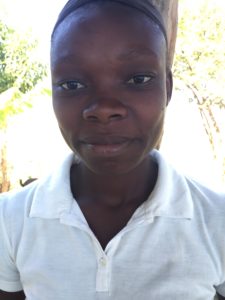 Modeline is excited about the progress that she has been making. Ever since her child’s father moved back to her from the Dominican Republic, his collaboration has helped her move ahead.
Modeline is excited about the progress that she has been making. Ever since her child’s father moved back to her from the Dominican Republic, his collaboration has helped her move ahead.
He came for a holiday visit with some of the money that they needed to buy lumber, and they now lack only a palm tree and some hardwood planks. And ever since he returned he’s taken over much of the work of caring for her livestock.
She’s also excited just to have him around. In the past, he’s come to Haiti only for short visits, but now he seems ready to stay for a while. “He’ll always go back and forth, but now he’ll stay more because we have something for him to work with.” Because he’s decided to stay in Haiti more, his mother is letting him farm some of her land, too, which only gives him more reason to stay around.
Having him in Haiti has had an unplanned consequence. Modeline thinks she’s pregnant,
Right now, the two are focused on organizing the funds they need to make sure he can farm the land. Most of it comes from saving a few pennies out of the 50 gourds he earns in the field every day.
So there isn’t much leftover that they could invest in the rest of the lumber they need. He will probably cross the border in May, when he’s done planting, to try to earn some quick cash.
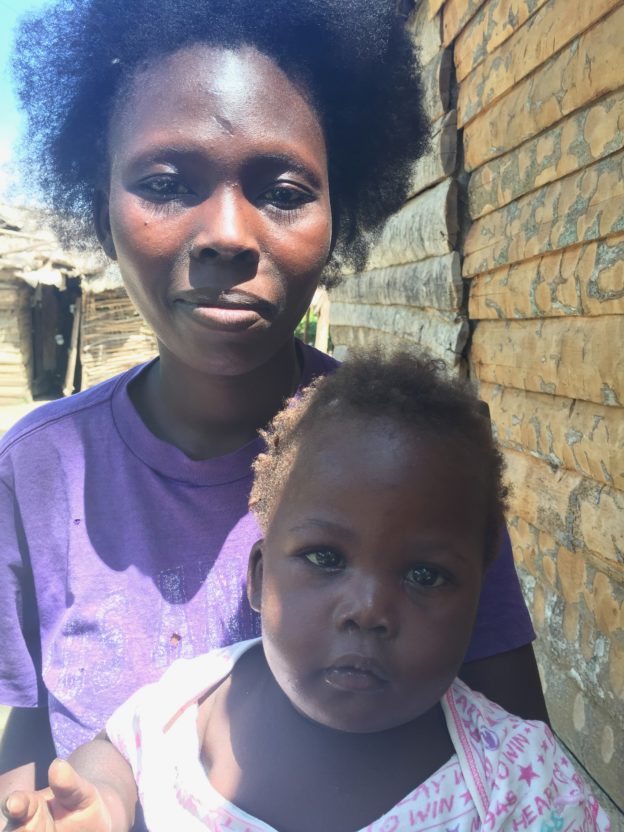
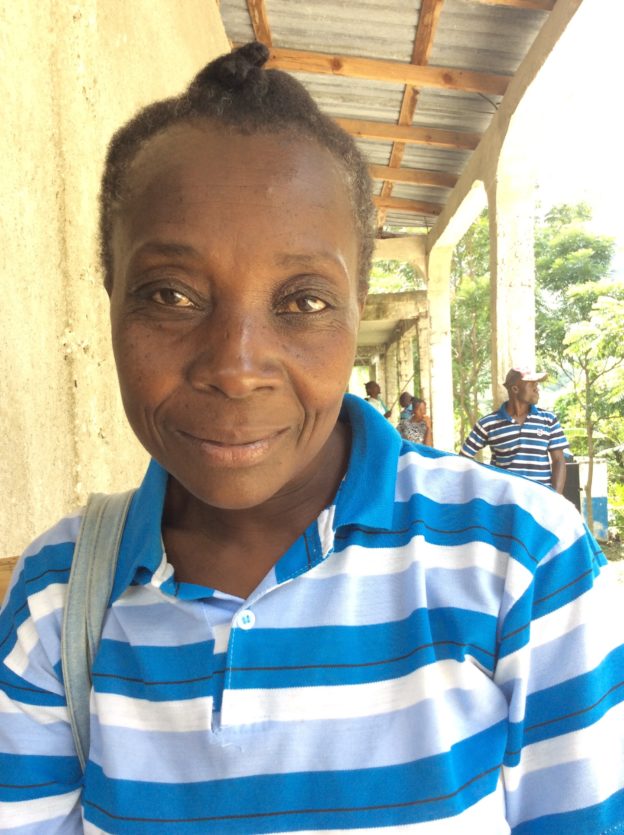
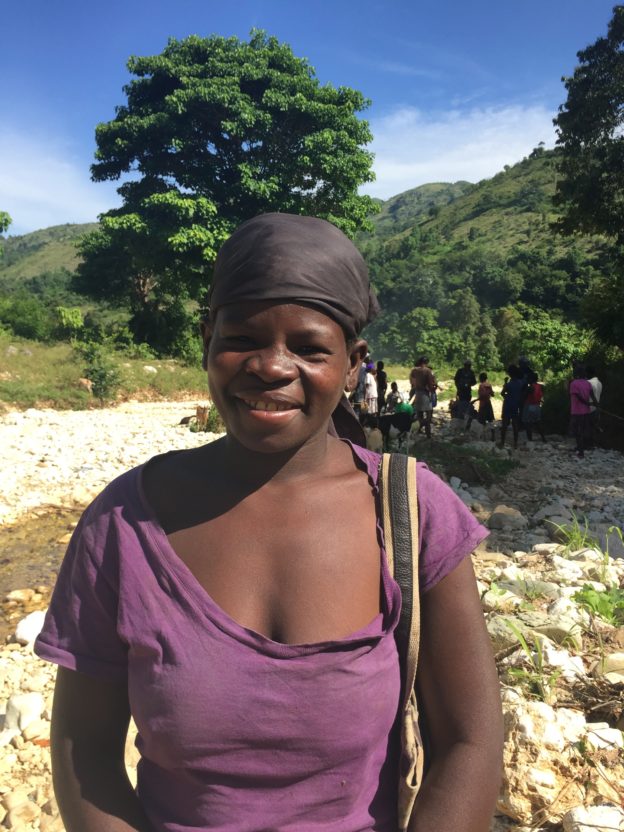
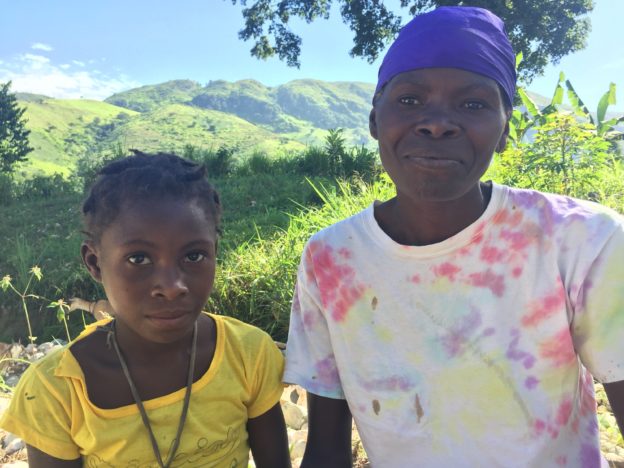
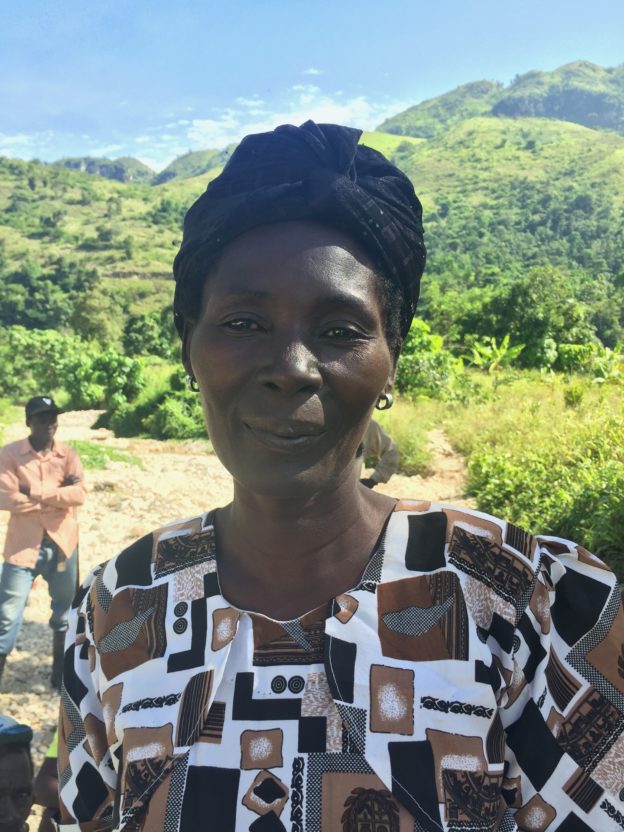
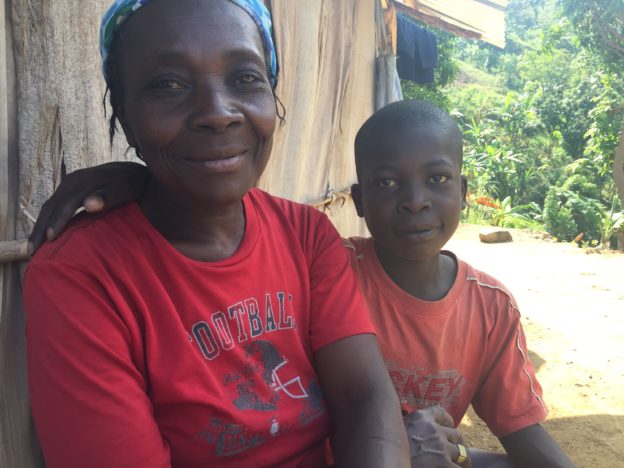
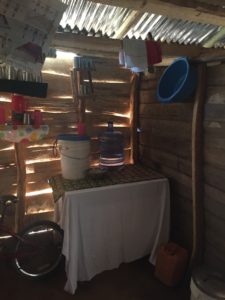 The experience left her feeling good about the CLM program and the team she works with, but her own recent efforts have her feeling good as well. Her home repair is complete. She has a little u-shaped house with two small rooms across the base and a separate, even-smaller room on each side. The smaller rooms are only accessible from the outside. They’re not connected to the larger ones. She set one aside as a storeroom. “I’ll keep the key to this room myself. When I start my small commerce, I’ll need a place to keep things secure.”
The experience left her feeling good about the CLM program and the team she works with, but her own recent efforts have her feeling good as well. Her home repair is complete. She has a little u-shaped house with two small rooms across the base and a separate, even-smaller room on each side. The smaller rooms are only accessible from the outside. They’re not connected to the larger ones. She set one aside as a storeroom. “I’ll keep the key to this room myself. When I start my small commerce, I’ll need a place to keep things secure.” 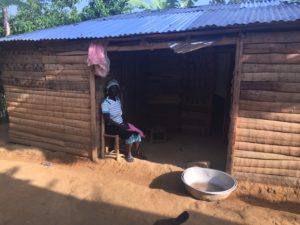
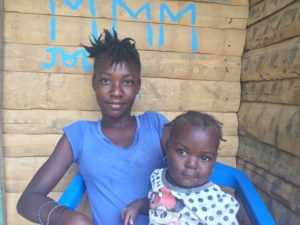 Miramène is also struggling. She’s been in her new house, but she hasn’t been able to make the other progress she’d like to make. Her goats are starting to multiply, and her pig is growing, but she had hoped to buy a turkey, too, and hasn’t been able to just yet.
Miramène is also struggling. She’s been in her new house, but she hasn’t been able to make the other progress she’d like to make. Her goats are starting to multiply, and her pig is growing, but she had hoped to buy a turkey, too, and hasn’t been able to just yet. 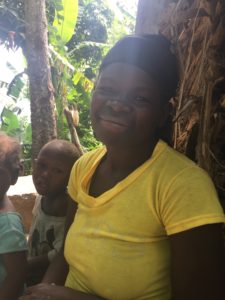 It is increasingly clear that Juslène has developmental issues in her way. She doesn’t communicate well, nor has she been able to think through even a small part of a plan.
It is increasingly clear that Juslène has developmental issues in her way. She doesn’t communicate well, nor has she been able to think through even a small part of a plan.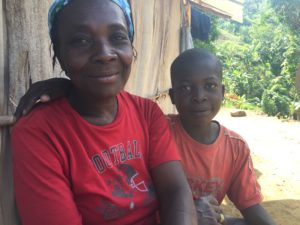 Idalia has made some progress since we last saw her. She’s settled into the idea of remaining in Gwo Labou until she graduates from the program. Then she plans to return to her home in Jinpaye, in the mountains between Kolonbyè and Granbwa.
Idalia has made some progress since we last saw her. She’s settled into the idea of remaining in Gwo Labou until she graduates from the program. Then she plans to return to her home in Jinpaye, in the mountains between Kolonbyè and Granbwa. 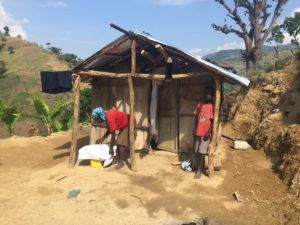
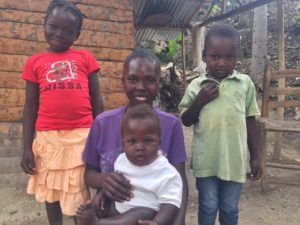 Rosemitha is making progress, though she’s still struggling. Her three goats are now five, with one of the adult females ready to have kids.
Rosemitha is making progress, though she’s still struggling. Her three goats are now five, with one of the adult females ready to have kids.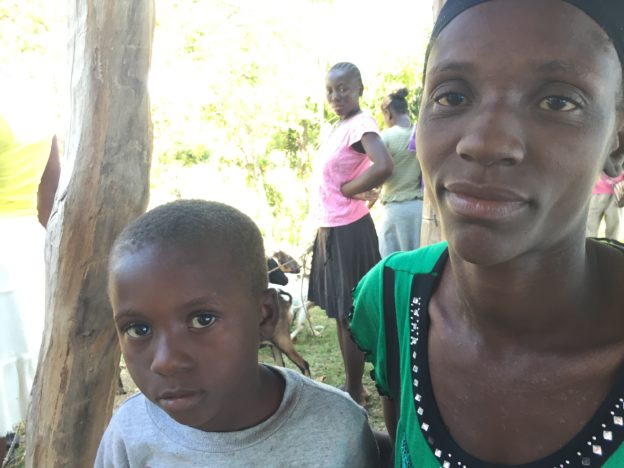


 She seems to have begun taking a more clear-eyed look at her situation, though. Until recently, she had been counting on her infant’s father to return from the Dominican Republic and help her with the expenses of setting up her new house, but a couple of promised visits failed to materialize, and she now recognizes that she has no idea when or even if he’ll come back. “Now I’m both mother and father to my kids,” she says.
She seems to have begun taking a more clear-eyed look at her situation, though. Until recently, she had been counting on her infant’s father to return from the Dominican Republic and help her with the expenses of setting up her new house, but a couple of promised visits failed to materialize, and she now recognizes that she has no idea when or even if he’ll come back. “Now I’m both mother and father to my kids,” she says. Altagrace is close to finishing her home because she decided to take a short cut. After sitting down with her husband and her mother, who owns the house they all live in now, she decided to repair that house rather than building a new one. “I wanted to stay with my mother. I’m all she has. And my husband agreed to the plan.”
Altagrace is close to finishing her home because she decided to take a short cut. After sitting down with her husband and her mother, who owns the house they all live in now, she decided to repair that house rather than building a new one. “I wanted to stay with my mother. I’m all she has. And my husband agreed to the plan.” Solène’s home is almost finished. It lacks only doors and windows, and the hardwood planks she’ll need to make and install them is ready. She’s just waiting for the carpenter to finish his job. She may have felt more rushed than other members of this group. “I was living in the shed we made for my goats, and we’d get soaked every time it rained.”
Solène’s home is almost finished. It lacks only doors and windows, and the hardwood planks she’ll need to make and install them is ready. She’s just waiting for the carpenter to finish his job. She may have felt more rushed than other members of this group. “I was living in the shed we made for my goats, and we’d get soaked every time it rained.” Modeline is excited about the progress that she has been making. Ever since her child’s father moved back to her from the Dominican Republic, his collaboration has helped her move ahead.
Modeline is excited about the progress that she has been making. Ever since her child’s father moved back to her from the Dominican Republic, his collaboration has helped her move ahead. 